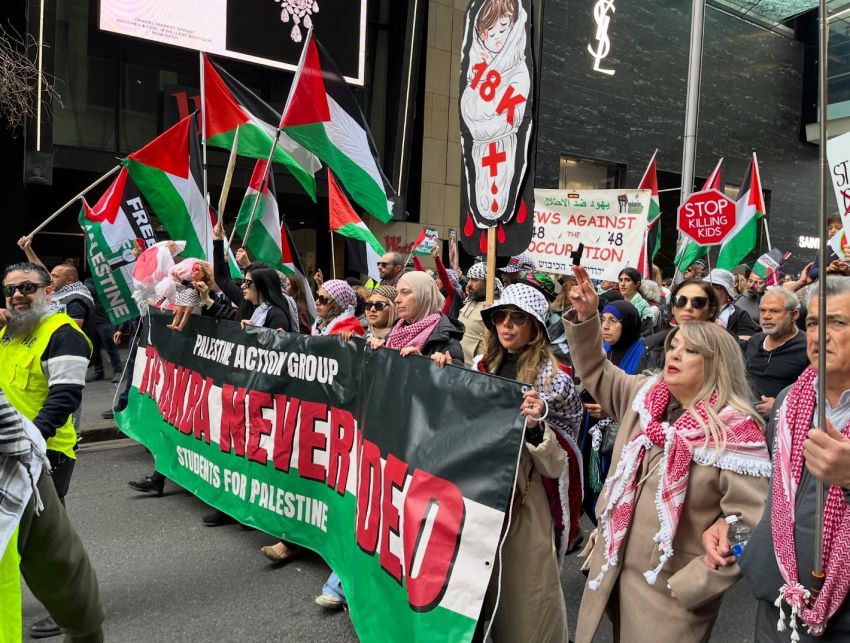
Jillian Segal, appointed by Labor last year as the misnamed Special Envoy to Combat Antisemitism, produced an action plan that gives the government what it wanted; her 13 proposals will allow it to more easily repress pro-Palestine solidarity.
Since Segal is the immediate past president of the pro-Israel Executive Council of Australian Jewry (ECAJ), this is exactly what the government intended by her appointment.
Prime Minister Anthony Albanese was again standing by Segal, literally, on July 10, when she presented her plan. The PM’s backing will empower state governments to move more draconian laws to repress the pro-Palestine movement.
Segal has form.
While she claims she is not responsible for the tens of thousands of dollars her husband and brother-in-law donated in 2023–24 to the racist, anti-immigrant and anti-Palestinian Advance Australia and Liberal Party, it is a stretch of the imagination that she did not know, or approve.
Perhaps a couple who have owned multiple properties valued altogether in the tens of millions of dollars don’t bother to discuss such amounts? But the standard for reasons to consider she might be biased cuts in at a lower level.
Nor can Segal get marks for originality: Her authoritarian approach is Trumpian.
Segal’s specific proposals overlap those put by ECAJ co-chair Alex Ryvchin at the Murdoch-owned Sky News’ antisemitism “summit” in February.
Segal’s plan, which is almost evidence-free, starts from her earlier September report in which her examples of antisemitism included anti-Israel posters and stickers, and accusations that the Israeli state practices apartheid.
That is how Segal tries to overcome her contradictions.
She told the ABC on July 11 that her proposals do not stop criticism of Israel “like any other country … but if you are calling for the elimination of the state of Israel, then that is antisemitic”.
But it is incumbent on everyone who opposes Israeli apartheid to campaign to eliminate that state structure. That is how democratic peoples have, for centuries, opposed tyranny.
What is remarkable about the Palestine solidarity movement, throughout its intense mobilisation over the last 21 months, is its efforts to distinguish Israeli actions from Jewish identity.
Segal denies that, telling the same ABC interviewer, “We have seen extraordinary violence on our streets”. She then motivates more laws against “intimidating protest activity”.
But it is precisely on the streets, especially the big pro-Palestine rallies, as well as on university campuses, where there has been no violence. There have, however, been police assaults on smaller protests, like that at the recent protest outside SEC Plating, where former Greens candidate Hannah Thomas and other activists were assaulted.
Segal, however, will not have that. She will “develop guidance” for officials and institutions, such as judges and the police. The public will also be educated in Segal’s more “thorough” understanding of antisemitism.
Segal is demanding that government, education and other institutions, and corporate and social peak bodies, adopt the International Holocaust Remembrance Alliance definition of antisemitism.
This is despite its lead author, Kenneth Stern, rejecting its weaponisation such that the Jewish Council of Australia has condemned its use “to silence legitimate criticism of Israel and Zionism”.
Segal’s response to the ABC’s questions was that “that train has moved on” and the JCA is “a very small group”. But her plan admits the opposite. It discusses what she considers unfavourable “differences in attitude … to the existence of the State of Israel” among people under 35 compared with the rest of the population.
Segal plans to punitively sanction cultural, educational and media organisations that fail to promote, or try to stop dissent against, Zionism. She hopes to slow the oncoming train of dissent to Israel’s genocide in Gaza.
Segal puts public funding for broadcasters, charities, cultural institutions and teaching and research at universities under question. She claims, without evidence, that “antisemitism … has become ingrained and normalised within academia and the cultural space”.
In fact, these institutions’ managements, often encouraged by Israeli state supporters, are ramping up repression of people with pro-Palestine views, as Antoinette Lattouf’s unfair dismissal case shows.
Segal offers her office as a monitor of media organisations — establishment, or critical and independent, against “false or distorted narratives”.
Yet, she opined in her ABC interview that Gaza-based journalists, working under the ever-present threat of Israeli assassination, are unreliable.
Overall, Segal reinforces irresponsible government and media efforts to suppress pro-Palestine solidarity.
Only a mass social force, grounded in anti-racist principles, will create the power to counterpose these and the settler-colonialist attitudes Segal and Albanese defend at home and internationally.
[Jonathan Strauss is a member of the Socialist Alliance National Executive.]